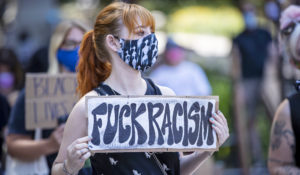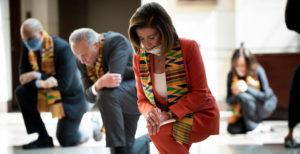When I worked in publishing in the early Noughties, “nobody is going to buy a book with a black girl on the cover” was a thing that people still said, out loud, in professional settings. The received wisdom was that books by and about marginalised people wouldn’t sell. At another meeting (a friend in marketing reported), a male sales rep scoffed that he’d never be able to sell a book because the cover model, a young woman with a Kardashian-esque physique, was “too fat” to be relatable.
That the industry had a diversity problem was impossible to argue with: “an analysis” of the gender makeup of the New York Times list shows how heavily it once skewed male — and how, in the last decade, a massive push to diversify publishing has enjoyed no small amount of success.
But God help any writer bold enough to say so.
When James Patterson noted in an interview last month that older white men weren’t getting writing jobs as easily as they used to, outrage ensued. After being savaged for a week online and in the media, Patterson apologised (not that this mollified his critics). This week, Joyce Carol Oates kicked the same hornet’s nest, writing on Twitter that “a friend who is a literary agent told me that he cannot even get editors to read first novels by young white male writers, no matter how good; they are just not interested”. This state of affairs, she added, was “heartbreaking for writers”, particularly those with the self-awareness to be duly aware of “their own privilege”. But the response from within the literary community was not sadness, but fury.
The outpouring of replies were split between people who argued that Oates’s assertion was false and people who argued that it was true but not heartbreaking, and in fact a real and unmitigated good. And then there were the people who argued both of these things simultaneously, sometimes even within the same breath. For whatever reason, this type of self-refuting argument is particularly ubiquitous on Twitter; the fallacy, which some have termed The Law of Salutary Contradiction, is best summed up as: “this isn’t happening, and also it’s good that it’s happening”. One representative reply read: “I am a literary agent. This is not so. And why ever would we invest our hopes in the continued success of white men in an industry which persists in shutting out queer and BIPOC authors?!”
Is it happening? With more than one extremely high-profile person flat-out accusing Oates of lying, it’s worth surveying the statistics. This is only an informal snapshot of the data, but one that still tells a story: of the 100 most recent debut book deals listed on Publisher’s Marketplace, 83 went to women. Of the remaining 17, 12 went to white men — ten of whom appear to be under the age of 40, and thus young by literary standards. It’s not a total shutout, of course, but it’s also not parity. And the same trend can be observed in terms of not just who’s published, but who’s celebrated; for instance, of the 13 books on the Booker longlist, released this week, three are by white men, none of whom are under 45 (one is the oldest ever recipient of a Booker nomination).
Of course, there are additional layers of data here that could surface additional meaning: how big the deal, what genre the book, whether the author had previously published as a poet or essayist or journalist. And of course, those who get book deals have always represented only the tiniest fraction of aspiring novelists: if the uphill battle for young white men is marginally steeper now, it was plenty steep before.
But when Oates’s agent friend reported that, “he cannot even get editors to read first novels by young white male writers”, it’s hardly far-fetched to think he was telling the truth — if not literally, then directionally, in the sense that an exasperated parent might report that they cannot get their toddler to put his shoes on. “I can’t get editors to look at these books” is a cultural observation, not a statistical one. It’s about the vibes, the gossip, the buzz, the discourse, the things that agents hear from editors and authors hear from agents. It’s about an industry veteran’s general sense of which way the wind is blowing. And on that front, when it comes to debut authors getting book deals, it is certainly blowing more favourably in the direction of non-white non-straight non-men.
Frankly, it would be weird if it were otherwise. From the moment that diversity became an industry cause, it enjoyed widespread, vocal support. In 2014, sparked by the revelation that white authors and characters absolutely dominated the YA marketplace, the We Need Diverse Books movement was born — and since then it has only gathered steam. Pitching contests were established for marginalised writers. Literary media pivoted to focus heavily on those writers. Submission guidelines were updated to explicitly ask for work from queer, gender-nonconforming writers of colour. Publishers announced that they were committed to diversifying their lists. Editors announced their intention to buy more books by marginalised writers. Agents publicly bemoaned how sick they were of reading submissions by white guys.
All of these sentiments were expressed vehemently, repeatedly, and in public, and all of them seemed to convey a consensus truth: an individual white man might still do okay in publishing, but categorically? White men were over, the rules had changed, and the anecdotal evidence seemed to support this. Did you hear about the guy whose book was yanked back on the eve of submission when his agent realised that his racial identity didn’t match the race of his protagonist? Or the white poet who couldn’t get published until he adopted a female Chinese pseudonym and won accolades — at least until he was found out?
The truth is, even if the data didn’t bear out the substance of Oates’s tweet, publishing culture matters when it comes to aspiring authors hoping to get a shot. Back when the problem was a lack of diverse books, it was known that the dearth of minority authors was at least in part a problem of preemptive discouragement: many promising writers, expecting the door to be slammed in their face, simply didn’t bother trying to get through at all. And yet, among those who advocated hardest for diverse books, it’s all but verboten to suggest that the movement has gained any meaningful ground, cultural or otherwise.
Why, after all this progress, do publishing’s gatekeepers resist any suggestion that diversification has been a success? It’s a paradox of the moment that a person is supposed to want this sort of change, demand it even, but also fly into a frothing rage at the notion that the desired change might in fact be happening. Maybe it’s that the survival of any progressive movement requires that you continually shift the goalposts, lest your organisation problem-solve its way into obsolescence. Maybe it’s a sense that however much has been accomplished, there’s work yet to be done. Or maybe it’s just the cognitive dissonance that always accompanies initiatives like this: everyone wants to say they’re hiring for diversity, but nobody wants to be seen as a diversity hire.
Or maybe the problem is that even a diverse publishing world will still never be fair — because this game has never been just about identity, or talent, but about timing, and resources, and pure dumb luck. If young white men aren’t the hottest commodity right now, it’s not just because publishers have convinced themselves it’s a moral imperative not to hire them; it’s because the industry follows the zeitgeist, and the zeitgeist of the moment is deeply invested in identity. The debut novels bought in 2022 thus far are not just overwhelmingly written by women, but overwhelmingly focused on race, gender, sexuality, or class.
Is this annoying? Maybe. But is it more annoying than the state of play ten years ago, when publishers were falling all over themselves to find the next sexually-charged teen dystopian-fantasy series about a merman and a werewolf fighting over a girl who doesn’t know she’s beautiful? Well, that’s a matter of taste. And like all literary trends, this one won’t last forever. Eventually, some new, attention-arresting thing will come on the scene, and the identitarian reckoning of 2020 will be yesterday’s news. Whenever that happens, and whatever it is, a handful of lucky writers will get swept up by the cresting wave of the zeitgeist and carried to glorious high ground, while everyone else looks on and makes grumbling noises.
Disclaimer
Some of the posts we share are controversial and we do not necessarily agree with them in the whole extend. Sometimes we agree with the content or part of it but we do not agree with the narration or language. Nevertheless we find them somehow interesting, valuable and/or informative or we share them, because we strongly believe in freedom of speech, free press and journalism. We strongly encourage you to have a critical approach to all the content, do your own research and analysis to build your own opinion.
We would be glad to have your feedback.
Source: UnHerd Read the original article here: https://unherd.com/




